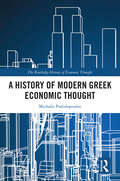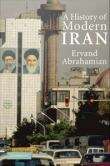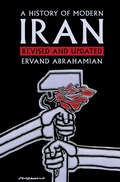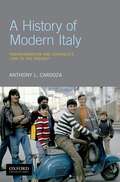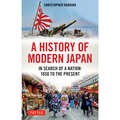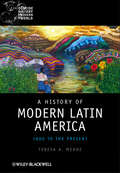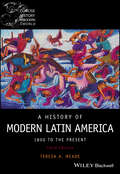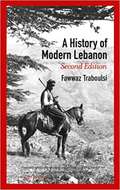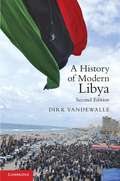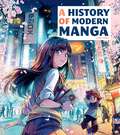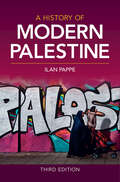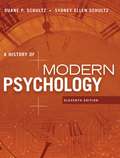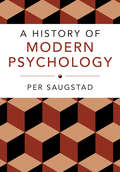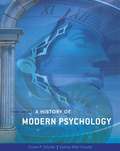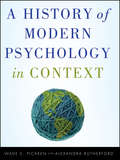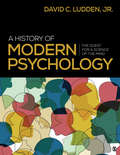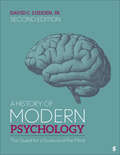- Table View
- List View
A History of Modern Greek Economic Thought (The Routledge History of Economic Thought)
by Michalis PsalidopoulosTracing the evolution of economic ideas in the context of the economic history and economic policy issues in Greece, this book examines the history of modern Greek economic thought from the War of Independence from Ottoman rule in 1821 until the present.The book explores how native, religious-oriented economic thought was secularized and merged with different economic discourses during successive historical periods. It traces how the dissemination of French and German economic thought in the 19th century was followed by British and US influences in the 20th century. The institutionalization of economics as a discipline in the 1920s and its internationalization after 1971, with their effects on the emergence of modern mainstream and heterodox thought, are also discussed. Finally, reference is made to contemporary Greek economic thought in the frame of European Union economic thinking.This book will be of interest to readers in the history of economic thought, economic history, intellectual history, Greek history, and modern European history more broadly.
A History of Modern Indonesia
by Adrian VickersAlthough Indonesia has the fourth largest population in the world, its history is still relatively unfamiliar and understudied. Guided by the life and writings of the country's most famous author, Pramoedya Ananta Toer, Adrian Vickers takes the reader on a journey across the social and political landscape of twentieth-century Indonesia in this innovative and timely account. He begins by explaining the country's origins under the Dutch in the early part of that century, the subsequent anti-colonial struggle and revolution which led to independence in 1949. Thereafter the spotlight is on the 1950s, a crucial period in the formation of Indonesia as a new nation, which was followed by the Sukarno years, and the anti-communist massacres of the 1960s when General Suharto took over as president. The concluding chapters chart the fall of Suharto's New Order after thirty two years in power, and the subsequent political and religious turmoil which culminated in the Bali bombings in 2002. Drawing on insights from literature, art and anthropology, Adrian Vickers portrays a complex and resilient people borne out of a troubled past.
A History of Modern Iran
by Ervand AbrahamianIn a reappraisal of Iran's modern history, Ervand Abrahamian traces its traumatic journey across the twentieth century, through the discovery of oil, imperial interventions, the rule of the Pahlavis and, in 1979, revolution and the birth of the Islamic Republic. In the intervening years, the country has experienced a bitter war with Iraq, the transformation of society under the clergy and, more recently, the expansion of the state and the struggle for power between the old elites, the intelligentsia and the commercial middle class. The author is a compassionate expositor. While he adroitly negotiates the twists and turns of the country's regional and international politics, at the heart of his 2008 book are the people of Iran. It is to them and their resilience that this book is dedicated, as Iran emerges at the beginning of the twenty-first century as one of the most powerful states in the Middle East.
A History of Modern Iran
by Ervand AbrahamianIn a radical reappraisal of Iran's modern history, Ervand Abrahamian traces the country's traumatic journey from the mid-nineteenth century to the present day, through the discovery of oil, imperial interventions, the rule of the Pahlavis, and the birth of the Islamic Republic. The first edition was named the Choice Outstanding Academic Title in 2009. This second edition brings the narrative up to date, with the Green uprisings of 2009, the second Ahmadinejad administration, the election of Rouhani, and the Iran nuclear deal. Ervand Abrahamian, who is one of the most distinguished historians writing on Iran today, is a compassionate expositor, and at the heart of the book is the people of Iran, who have endured and survived a century of war and revolution.
A History of Modern Israel
by Colin ShindlerThe state of Israel came into existence in 1948. Colin Shindlers book traces Israels history across sixty years, from its optimistic beginnings - immigration, settlement, the creation of its towns and institutions - through the wars with its Arab neighbours, and the confrontation with the Palestinians. Shindler paints a broad canvas which affords unusual insights into this multicultural society, forged from over a hundred different Jewish communities and united by a common history. Despite these commonalities, however, Israel in the twenty-first century is riven by ideological disputes and different interpretations of Jewishness and Judaism. Nowhere are these divisions more revealingly portrayed than in the lives and ideologies of Israels leaders. Biographical portraits of Ben Gurion, Israels first prime-minister, Yitzhak Rabin, whose assassination is still a traumatic memory for many Israelis, and the controversial Ariel Sharon, offer fascinating examinations of those who have led the country to where it is today.
A History of Modern Italy: Transformation and Continuity, 1796 to the Present
by Anthony L. CardozaA History of Modern Italy addresses the question of how Italy's modern history--from its prolonged process of nation-building in the nineteenth century to the crises of the last two decades--has produced a paradoxical blend of hyper-modernity and traditionalism that sets the country apart in the broader context of Western Europe. <p><p>Author Anthony L. Cardoza explores how Italians have experienced seismic shifts in their social and economic landscape over the past two centuries, while simultaneously maintaining older cultural norms, social practices, and political methods. <p><p>The book's narrative of modern Italy incorporates and blends the research findings and methodological insights of the new quantitative and cultural historical scholarship of the past twenty-five years. In doing so, the book chronicles the regime changes that have taken the country from a liberal monarchy, through a fascist dictatorship, to a democratic republic while also delving into the economic and social history of the nation through these periods.
A History of Modern Japan: In Search Of A Nation: 1850 To The Present
by Christopher HardingIn A History of Modern Japan, cultural historian Christopher Harding delves into the untold stories of Japan's recent history—from a pop star's nuclear power protest song in 2011, to Japanese feminists who fought for an equal political voice in the 1890s. <p><p> Though highly successful, and typically portrayed as a unified effort, Japan's rebuilding throughout the 20th century faced a lot of domestic criticism. This story-led account gives a voice to those who felt they didn't fit in with what Japan was becoming. It's that push and pull that made the country what it is today. <p><p> This book will be a fascinating read for anyone interested in Japanese culture—whether film and literature, or pop culture and manga—as big shifts in Japanese ideology and society tend to come from culture and the arts, rather than being politically-driven. It will also be of interest to those traveling to Japan who want a better sense of the place, or anyone seeking to better understand Japan's role on the global stage. <p><p> With over 100 photographs, maps and prints, A History of Modern Japan showcases the compelling story of Japan's amazing growth and its resulting struggles. For all the country's advancement, the Japanese people continue to wrestle with the notion of what it means to be Japanese in a changing world.
A History of Modern Latin America: 1800 to the Present (Wiley Blackwell Concise History of the Modern World #4)
by Teresa A. MeadeA History of Modern Latin America: 1800 to the Present examines the diverse and interlocking experiences of people of indigenous, African, and European backgrounds from the onset of independence until today. Illustrates and analyzes the major and minor events that shape history, the triumphs and defeats, and the everyday lives of people of varied classes and racial and ethnic backgrounds Intersperses accounts of the lives of prominent figures with those of ordinary people Emphasizes gender's role in influencing political and economic change and shaping cultural identity Student and instructor resources available at http://minerva.union.edu/meadet/modernlatinamerica/index.html [Wiley disclaims all responsibility and liability for the content of any third-party websites that can be linked to from this website. Users assume sole responsibility for accessing third-party websites and the use of any content appearing on such websites. Any views expressed in such websites are the views of the authors of the content appearing on those websites and not the views of Wiley or its affiliates, nor do they in any way represent an endorsement by Wiley or its affiliates.]
A History of Modern Latin America: 1800 to the Present (Wiley Blackwell Concise History of the Modern World)
by Teresa A. MeadeExplores the modern history of Latin America using an intersectional approach, newly revised and updated. A History of Modern Latin America: 1800 to the Present, Third Edition offers a lively account of the rich political, cultural, and social history of the independent nation-states of Latin America and the Caribbean. Viewing Latin American history through the lens of social class, gender, race, and ethnicity, this accessible textbook explores the complex set of personalities, issues, and events that intersect to form the Latin American historical landscape. Written in a clear and engaging narrative style, the fully updated third edition examines specific events in different nations and periods to illustrate broader historical trends and interpretations. Concise chapters feature first-hand accounts of the life history of both prominent and ordinary people to contextualize topics such as African slavery in the Americas, the struggle for Haitian independence, the patriarchal rules governing marriage in Brazil, the construction of the Panama Canal, indigenous uprisings in the Mexican Revolution, the impact of immigration on Latin American life, the opening of diplomatic relations between the United States and Cuba, and more. Presents documents and excerpts from fiction to serve as concrete examples of historical ideas Examines gender and its influence on political and economic change Highlights the role of music, art, sports, movies, and other popular culture in the formation of Latin American cultural identity Includes a summary of European colonialism and an overview of Latin America in the 21st century Provides end-of-chapter review questions, discussion topics, and suggested readingsPart of the popular Wiley Blackwell Concise History of the Modern World series, the third edition of A History of Modern Latin America: 1800 to the Present is an excellent textbook for introductory and intermediate undergraduate students as well as high school students taking advanced/honors Latin American history courses.
A History of Modern Lebanon
by Fawwaz TraboulsiThis is the second updated edition of the first comprehensive history of Lebanon in the modern period. Written by a leading Lebanese scholar, and based on previously inaccessible archives, it is a fascinating and beautifully-written account of one of the world's most fabled countries. <p><p> Starting with the formation of Ottoman Lebanon in the 16th century, Traboulsi covers the growth of Beirut as a capital for trade and culture through the 19th century. The main part of the book concentrates on Lebanon's development in the 20th century and the conflicts that led up to the major wars in the 1970s and 1980s. This edition contains a new chapter and updates throughout the text. <p><p> This is a rich history of Lebanon that brings to life its politics, its people and the crucial role that it has always played in world affairs.
A History of Modern Libya
by Dirk VandewalleDirk Vandewalle is one of only a handful of scholars to have frequently visited Libya over the last four decades. Here he tracks Libya's story from the 1900s to the Italian occupation in the early twentieth century, through the Sanusi monarchy and, thereafter, to the revolution of 1969 and the accession of Qadhafi. Chapters analyse the economics and politics of Qadhafi's revolution, offering insights into the man and his ideology as reflected in his Green Book. This updated edition includes coverage of the period 2003-2011, as Libya finally came in from the cold after years of political and economic isolation. The agreement to give up a weapons of mass destruction program paved the way for improved relations with the West. By this time, though, Qadhafi had lost support at home and, despite attempts to liberalize the economy, real structural reform proved impossible. This, coupled with tribal rivalries, regional division and a general lack of unity, paved the way for revolution and civil war.
A History of Modern Manga
by Insight EditionsDiscover the major events and artists who have shaped the history of modern manga, with this deluxe expanded volume.Amid reconstruction after World War II, Japan saw the emergence of modern manga, which quickly became a favorite pastime of its citizens. Over the decades, the art form bore witness to the anxieties and dreams of several generations of Japanese citizens, reflecting both dark and joyful experiences. The history of manga is inextricably linked to the social, economic, political, and cultural evolution of Japan. Essential to the daily lives of its inhabitants and to its economy, manga is one of the drivers of the international development of one of the world&’s largest economies. How did the manga market reach one billion copies annually in less than half a century? Who are the major players in this incredible expansion? Discover, over the pages and years, the major events and artists who have marked the history of modern manga in this new, updated and expanded edition. DEFINITIVE GUIDE: Beginning with the advent of modern manga in 1952, A History of Modern Manga covers the development and impact of the art form through to present day. THE ULTIMATE TRIBUTE: Discover fascinating new details about essential entries in the manga canon, including Sailor Moon, Dragon Ball, Death Note, Naruto, Berserk, and more. STUNNING VISUALS: Features original, full-color illustrations as well as artwork from the featured manga titles! PERFECT GIFT FOR MANGA FANS: A History of Modern Manga is a fantastic gift for manga enthusiasts, as well as fans of Japanese history. A MANGA HISTORICAL PERSPECTIVE: Explores the unique ways in which historical events you may already be familiar with impacted and influenced manga as we know it today.
A History of Modern Morocco
by Susan Gilson MillerMorocco is notable for its stable and durable monarchy, its close ties with the West, its vibrant cultural life and its centrality to regional politics. This book, by distinguished historian Susan Gilson Miller, offers a richly documented survey of modern Moroccan history. Arguing that pragmatism rather than ideology has shaped the monarchy's response to crisis, the book begins with the French invasion of Algeria in 1830 and Morocco's abortive efforts at reform, the duel with colonial powers and the loss of independence in 1912, the burdens and benefits of France's forty-four year dominion and the stunning success of the nationalist movement leading to independence in 1956. In the post-independence era, the book traces the monarchy's gradual monopolization of power and the resulting political paralysis, with a postscript bringing events up to 2012. This concise, readable book will inform and enthral students and all those searching for the background to present-day events in the region.
A History of Modern Oman
by Jeremy JonesThe ideal introduction to the history of modern Oman from the eighteenth century to the present, this book combines the most recent scholarship on Omani history with insights drawn from a close analysis of the politics and international relations of contemporary Oman. Jeremy Jones and Nicholas Ridout offer a distinctive new approach to Omani history, building on postcolonial thought and integrating the study of politics and culture. The book addresses key topics including Oman's historical cosmopolitanism, the distinctive role of Omani Islam in the country's social and political life, Oman's role in the global economy of the nineteenth century, insurrection and revolution in the twentieth century, the role of Sultan Qaboos in the era of oil and Oman's unique regional and diplomatic perspective on contemporary issues.
A History of Modern Palestine
by Ilan PappeIlan Pappe writes the story of Palestine, a land inhabited by two peoples. It begins with the Ottomans in the early 1800s and traces a path through the arrival of the early Zionists at the end of that century, through the British mandate at the beginning of the twentieth century, the establishment of the state of Israel in 1948, and the subsequent wars and conflicts which culminated in the intifadas of 1987 and 2000. While these events provide the background to the narrative and explain the construction of Zionist and Palestinian nationalism, at centre stage are those who lived through these times, men, women and children, Jews and Arabs. It is a story of coexistence, as well as oppression, occupation, and exile. Ilan Pappe is well-known as a revisionist historian of Israel. Lucid and typically forthright, his account is a unique contribution to the history of this troubled land.
A History of Modern Palestine: One Land, Two Peoples
by Ilan PappeIlan Pappe's book is the story of Palestine, a land inhabited by two peoples, with two national identities. It begins with the Ottomans in the early iSoos, the reign of Muhammad Ali, and traces a path through the arrival of the early Zionists at the end of that century, through the British mandate at the beginning of the twentieth century, the establishment of the state of Israel in 1948, and the subsequent wars and conflicts which culminated in the intifadas of 1987 and 2000. At center stage are those who lived through these times, men and women, children, peasants, workers, town-dwellers, Jews and Arabs.
A History of Modern Palestine: One Land, Two Peoples
by Ilan PappeTracing the history of Palestine from the Ottomans in the nineteenth century, through the British Mandate, the establishment of the state of Israel in 1948, and the subsequent wars and conflicts which have dominated this troubled region, Ilan Pappe's widely acclaimed A History of Modern Palestine provides a balanced and forthright overview of Palestine's complex history. Placing at its centre the voices of the men, women, children, peasants, workers, town-dwellers, Jews and Arabs of Palestine, who lived through these times, this tells a story of co-existence and co-operation, as well as oppression, occupation, and exile, exposing patterns of continuity as well as points of fracture. Now in an updated third edition, Pappe draws links between contemporary events, from war in Lebanon, violence in the Gaza Strip and the Arab Spring, with the long history of Palestine, taking into account the success of Israel without neglecting the on-going catastrophe suffered by Palestinians, leaving hope for a better future for all who live in, or were expelled, from Palestine.
A History of Modern Psychology
by Duane P. Schultz Sydney Ellen SchultzThe focus of this book is the history of modern psychology, the period beginning in the late nineteenth century, when psychology became a separate and independent discipline. Although, the authors briefly review earlier philosophical thought, they concentrate on issues directly related to the establishment of psychology as a new and distinct field of study. The purpose is to present a history of modern psychology, not the centuries of philosophical work that preceded it. Although the chapters are organized in terms of the schools of thought, these systems resulted from the work of individual scholars, researchers, organizers, and promoters. With the hindsight of history, the authors trace the pattern and the continuity of the development of modern psychology.
A History of Modern Psychology
by Per SaugstadA History of Modern Psychology provides students with an engaging, comprehensive, and global history of psychological science, from the birth of the field to the present. It examines the attempts to establish psychology as a science in several countries and epochs. The text expertly draws on a vast knowledge of the field in the United States, England, Germany, France, Russia, and Scandinavia, as well as on author Per Saugstad's keen study of neighboring sciences, including physiology, evolutionary biology, psychiatry, and neurology. Offering a unique global perspective on the development of psychology as an empirical science, this text is an ideal introduction to the field for students and other readers interested in the history of modern psychology.
A History of Modern Psychology (Tenth Edition)
by Duane P. Schultz Sydney Ellen SchultzIn this book, the authors personalize the history of psychology not only by using biographical information on influential theorists, but also by showing you how major events in those theorists' lives have affected the authors' own ideas, approaches, and methods.
A History of Modern Psychology in Context
by Alexandra Rutherford Wade PickrenA fresh look at the history of psychology placed in its social, political, and cultural contextsA History of Modern Psychology in Context presents the history of modern psychology in the richness of its many contexts. The authors resist the traditional storylines of great achievements by eminent people, or schools of thought that rise and fall in the wake of scientific progress. Instead, psychology is portrayed as a network of scientific and professional practices embedded in specific temporal, social, political, and cultural contexts. The narrative is informed by three key concepts--indigenization, reflexivity, and social constructionism--and by the fascinating interplay between disciplinary Psychology and everyday psychology.The authors complicate the notion of who is at the center and who is at the periphery of the history of psychology by bringing in actors and events that are often overlooked in traditional accounts. They also highlight how the reflexive nature of Psychology--a science produced both by and about humans--accords history a prominent place in understanding the discipline and the theories it generates.Throughout the text, the authors show how Psychology and psychologists are embedded in cultures that indelibly shape how the discipline is defined and practiced, the kind of knowledge it creates, and how this knowledge is received. The text also moves beyond an exclusive focus on the development of North American and European psychologies to explore the development of psychologies in other indigenous contexts, especially from the mid-20th-century onward.
A History of Modern Psychology: The Quest for a Science of the Mind
by David C. LuddenA History of Modern Psychology: The Quest for a Science of the Mind presents a history of psychology up to the turn of the 21st century. Author David C. Ludden, Jr. uses a topical approach to discuss key thinkers and breakthroughs within the context of various schools of thought, allowing students to see how philosophers, researchers, and academics influenced one another to create the rich and diverse landscape of modern psychology. Through detailed timelines and Looking Back and Looking Ahead sections, the book provides connections between movements and gives students a deeper appreciation for the transference of knowledge that has shaped the field.
A History of Modern Psychology: The Quest for a Science of the Mind
by David C. LuddenA History of Modern Psychology: The Quest for a Science of the Mind presents a history of psychology up to the turn of the 21st century. Author David C. Ludden, Jr. uses a topical approach to discuss key thinkers and breakthroughs within the context of various schools of thought, allowing students to see how philosophers, researchers, and academics influenced one another to create the rich and diverse landscape of modern psychology. Through detailed timelines and Looking Back and Looking Ahead sections, the book provides connections between movements and gives students a deeper appreciation for the transference of knowledge that has shaped the field.
A History of Modern Psychology: The Quest for a Science of the Mind
by David LuddenA History of Modern Psychology: The Quest for a Science of the Mind describes the evolution of psychology into the twenty-first century with coverage of recent events and findings that transform our understanding of the past. With a topical approach that presents key thinkers within the context of schools of thought, students are able to see how philosophers, researchers, and academics influenced one another to create the rich and diverse landscape of modern psychology in a global context. In the new Second Edition, the author expands coverage of unsung pioneers (philosopher Al-Balkhi, zoologist Charles Henry Turner, psychiatrist Grunya Sukhareva, and others), revisits the legacy of Francis Galton, explores the "Vygotsky boom," and includes new discussion of the impact of Philip Zimbardo′s Stanford Prison Experiment. Through detailed timelines and features such as "Looking Back" and "Looking Ahead," Ludden gives students a deeper appreciation for the transference of knowledge that shaped the field.
A History of Modern Psychology: The Quest for a Science of the Mind
by David LuddenA History of Modern Psychology: The Quest for a Science of the Mind describes the evolution of psychology into the twenty-first century with coverage of recent events and findings that transform our understanding of the past. With a topical approach that presents key thinkers within the context of schools of thought, students are able to see how philosophers, researchers, and academics influenced one another to create the rich and diverse landscape of modern psychology in a global context. In the new Second Edition, the author expands coverage of unsung pioneers (philosopher Al-Balkhi, zoologist Charles Henry Turner, psychiatrist Grunya Sukhareva, and others), revisits the legacy of Francis Galton, explores the "Vygotsky boom," and includes new discussion of the impact of Philip Zimbardo′s Stanford Prison Experiment. Through detailed timelines and features such as "Looking Back" and "Looking Ahead," Ludden gives students a deeper appreciation for the transference of knowledge that shaped the field.
